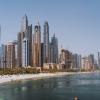
Ecosystem degradation and conversion now poses severe threat to the biodiversity, habitation, and food security of Kazakhstan and other countries of the Asian Dryland Belt (ADB) region. Without intervention, there is risk that a positive feedback loop could be triggered which worsens degradation by increasing the need for harsher chemicals and fertilisers to maintain yield. Sequestration of carbon into degraded land is a rapidly advancing field of research. Could this be a solution toward land restoration in the ADB?
Agriculture is a vital source of economic progress and societal wellbeing for Kazakhstan and other countries in ADB. However, intensive agricultural practices have also become counterproductive, degrading land swathes through overuse of pesticides, fertilizers, and reliance on extractive processes such as monoculture and rapid rotation between crops. Capturing and storing carbon into soil allows for land restoration which could provide means to ecosystem and biodiversity restoration in severely affected areas. Furthermore, sequestering carbon into soil, e.g., by reviving grasslands and croplands, or by adding biochar to degraded soil can provide a highly effective means to reduce the levels of atmospheric carbon dioxide.
The Advancing Systems Analysis (ASA) program has teamed with the Center for the Joint Stock Company Center for Development and Protection of Competition Policy (JSC) in Kazakhstan; and the Food and Biodiversity Land-Use, and Energy (FABLE) Consortium to analyze the prospects and scenarios of setting up a pilot initiative focused on implementing a negative emission units production in Kazakhstan and extending trade of negative emission units to Eurasia. The project will focus on the potential for carbon sequestration and land restoration in degraded regions of northern Kazakhstan.
The reasons for exploring agricultural carbon sequestration and trading specifically are two-fold. Firstly, arid ecosystems and grass lands are the most cost-efficient types of biomes for restoration which means that Kazakhstan could implement agricultural sequestration initiatives at lower cost relative to afforestation or air-carbon capture technologies. Secondly, Kazakhstan’s agricultural sector already employs a large percentage of the population, however, climate change could jeopardize the long-term security of their livelihoods. NET schemes can provide an alternative income stream for farmers, land managers, and wider rural communities.
By removing CO2 from the atmosphere and capturing it into biomass and soil, carbon farming can complement efforts to reinstate soil quality and agricultural productivity for other uses in Central Asian regions where agriculture is still a sizable contributor to GDP. This means that farmers can improve yields in other crops, require fewer tillage machinery, and benefit from an overall more fertile and resilient land. Broader economic opportunities for rural communities meanwhile could also bring productivity improvements. Regionally, involvement in carbon farming could enable communities to attain diversified employment skills and create jobs within small and medium sized enterprises - particularly if international trading partnerships for negative emission units are established.
As countries look for new pathways to mitigate their CO2 emissions, the need to understand carbon sequestration and subsequent trading of negative emissions will grow. This provides a remarkable and timely opportunity for Kazakhstan and Eurasia to develop carbon dioxide sequestration and removal initiatives which not only support the domestic land and ecosystem restoration but also produce a tradeable commodity which promises sustainable demand in the long run.
To watch our inaugural dialogue in Astana, click here
To read our event report, click here
To find out more about the FABLE Consortium, click here
News items and publications on events related to project CAMEA
Lowering Kazakhstan’s carbon emissions in trade. Published in October 2022 by the Intracen on the Inaugural Dialogue Scaling up climate-action in Eurasia: Carbon Farming and Trading.
ESG Investment Forum as a dialogue platform for alternative methods of combating climate change. Published in October 2022 by Astana International Finance Center on the Inaugural Dialogue Scaling up climate-action in Eurasia: Carbon Farming and Trading.
Kazakhstan plans to adopt carbon farming. Published in October 2022 by Jibek Joly TV on the Inaugural Dialogue Scaling up climate-action in Eurasia: Carbon Farming and Trading.
Kazakhstan plans to use carbon farming. Published in October 2022 by Khabar News on the Inaugural Dialogue Scaling up climate-action in Eurasia: Carbon Farming and Trading.
Virgin carbon soil: will Kazakhstan be able to turn waste land into emission sinks and make money on it? Published in November 2022 by ULYS Media on the Inaugural Dialogue Scaling up climate-action in Eurasia: Carbon Farming and Trading.
HSE Experts: Carbon Farming is an Important Stimulus for Socio-Economic Development. Published in October 2023 by BRICS Competition Law and Policy Center on the Roundtable Discussions with the Ministry of Ecology for the Republic of Kazakhstan.
Serik Zhumangarin: Kazakhstan companies not limited in offsets for climate projects. Published in October 2023 by Official Info Source Prime Minister RoK on the Roundtable Discussions with the Ministry of Ecology for the Republic of Kazakhstan.
International inaugural dialogue “scaling up climate action in Eurasia: carbon farming and trading”. Published in October 2023 by BRICS Competition Law and Policy Center on the Roundtable Discussions with the Ministry of Ecology for the Republic of Kazakhstan.
Experts from HSE University Explore Prospects for Carbon Farming in Kazakhstan. Published in November 2023 by Higher School of Economics News on the Roundtable Discussions with the Ministry of Ecology for the Republic of Kazakhstan.
Kazakhstan Explores Carbon Farming, Sustainable Land Management. Published in November 2023 by Mirage News on the Roundtable Discussions with the Ministry of Ecology for the Republic of Kazakhstan.
Kazakhstan is championing climate-smart farming – Report says. Published in December 2023 by African Business on the Presentation for Carbon Farming in Kazakhstan at the COP28 in Dubai.
Kazakhstan is championing climate-smart farming – Report says. Published in December 2023 by Mid-East Info on the Presentation for Carbon Farming in Kazakhstan at the COP28 in Dubai.
The Centre's Experts Delivered a Report on The Prospects of Carbon Farming in Kazakhstan At Cop28 In Dubai. Published in December 2023 by BRICS Competition Law and Policy Center on the Presentation for Carbon Farming in Kazakhstan at the COP28 in Dubai.
News

01 February 2024
Navigating the Nexus of Geopolitics and Technological Developments in Eurasia

01 February 2024
ASA at COP28: Carbon farming for Central Asia

27 November 2023
Exploring Promising Pathways for Carbon Farming and Sustainable Land Management in Kazakhstan
Pagination
- Page 1
- Next page Next ›



